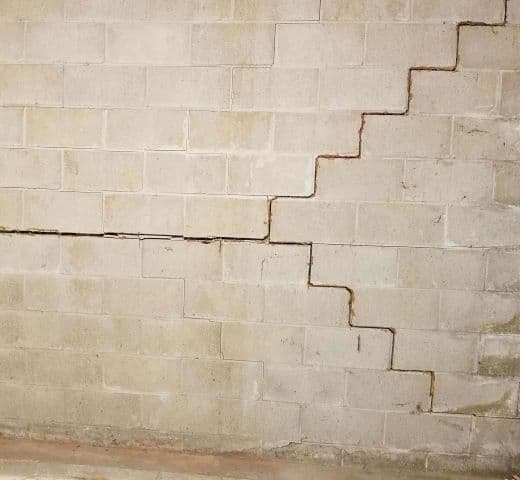Are Cracks in the Foundation Normal?
Imagine yourself standing within the confines of your home, the place that provides shelter, comfort, and safety. As you gaze at the walls, you begin to notice something rather unsettling – fine lines and subtle crevices etched into the foundation of your house. It’s a common sight in many homes, but it sparks a question that can send shivers down any homeowner’s spine: “Are these foundation crack normal?”
Your home’s foundation is the unsung hero that supports everything above it, and its stability is essential for your peace of mind. However, it’s common for these foundations to develop crack over time, leaving you to wonder about their significance. In this article, we embark on a journey into the fascinating world of foundation crack. We’ll explore their origins, discuss their potential implications, and emphasize the importance of addressing them.
Understanding Foundation Cracks
The gaps are a common occurrence in many homes, and they can vary in size, shape, and severity. It’s essential to understand that not all foundation crack are created equal. Some small hairline crack may be considered normal wear and tear due to settling, while others may indicate more significant structural issues.
- It can range from hairline fractures to larger, more concerning crevices.
- Different factors, such as the age and materials of your home, can influence the occurrence of foundation crack.
- Understanding the type and severity of foundation crack is crucial for determining whether they are normal or require immediate attention.
Are Foundation Cracks Normal?
To thoroughly address the central question of this article, we need to delve into the intricacies of foundation gaps and their normalcy. Cracks come in various forms and sizes, and distinguishing between everyday occurrences and those demanding immediate attention is paramount. Basement crack repair is essential to prevent water infiltration and maintain a dry living space.
- Hairline Cracks in New Constructions:
In the context of new constructions, it’s essential to acknowledge that minor hairline foundation gaps are relatively common. These cracks often make their appearance during the settling process of a newly built house. Such hairline gaps are typically the result of the home adapting to its new environment. Minor temperature fluctuations, soil settlement, and concrete curing can contribute to these minor cracks. In most cases, they are not indicative of underlying structural problems. Instead, they are akin to the natural adjustments a new building undergoes as it finds its place within the landscape.Therefore , Concrete crack repair is a critical step for your foundation.
- Subtle Signs of Aging:
Foundation cracks can also be considered normal when they emerge as a house age. Similar to how wrinkles accumulate on a person’s skin with the passage of years, small, fine foundation gaps may be regarded as part of the wear and tear of a property. These subtle signs of aging may result from prolonged exposure to environmental elements, such as temperature variations, moisture, and soil conditions. While these gaps are generally considered normal, monitoring them for any signs of progression or exacerbation is essential.
It’s important to emphasize that even though inevitable foundation cracks can be deemed normal in specific circumstances, close attention and monitoring are vital. Regular inspections can help identify any unusual changes or patterns in the cracks.
In cases where foundation cracks appear in a manner that deviates from the typical signs of settling or aging, or if they become more significant in size, it is advisable to consult with professionals specializing in fixing foundation cracks and repairing basement gaps. These experts can evaluate the situation, recommend the appropriate concrete crack repair methods, and address any underlying issues that may require attention. In doing so, homeowners can maintain their properties’ long-term stability and value.
When to Consider Foundation Crack Repair
While some foundation gaps are benign and part of aging, others indicate more severe structural issues. Recognizing when these situations require attention is crucial.
- Widening and Jagged Cracks: If you notice foundation gaps that are not merely hairline and are instead widening or have a jagged appearance, these may be signs of more significant concerns.
- Accompanying Warning Signs: Watch for attending indicators of trouble. If you notice doors no longer closing correctly, windows sticking, or floors becoming uneven, these red flags warrant immediate attention. Ignoring these signs can lead to compounding problems and substantial repairs.
Concrete Crack Repair for Durability
Concrete, the most prevalent foundation material, is susceptible to developing gaps. Ensuring its durability is critical.
Regular inspections by professional companies can help identify concrete gaps before time, allowing for timely repairs that can extend the life and integrity of your home’s foundation.
Preserving Longevity: Concrete crack repair is not just about addressing cosmetic issues but about preserving the longevity and durability of your home. Neglecting concrete gaps can lead to more severe problems over time.
When to Suspect Foundation Cracks
Foundation gaps should be given immediate attention, as neglecting them can result in their deterioration over time and the development of substantial structural issues.Fixing foundation cracks is imperative to ensure the stability of your home’s structure and prevent further damage. Ignoring the task of fixing foundation cracks can lead to costly repairs in the future. Home insurance can be a lifesaver in situations where foundation cracks lead to costly structural repairs, as it can help cover some of the expenses associated with fixing the damage.
Here are some key indicators of when you should suspect that you may have foundation cracks:
- Visual Cracks: If you can visibly see gaps in the walls inside and outside your home, it’s time to investigate further.
- Multiple Signs: When you notice several warning signs mentioned earlier co-occurring, it strongly indicates that something may be wrong with your foundation.
- Recent Changes: If you’ve observed these signs appearing suddenly or noticed a rapid progression in the cracking, it’s essential to act promptly.
- Water Infiltration: If water seeps through the cracks, it’s not only a structural concern but also a risk for mold growth and basement flooding.
- Persistent Issues: If you’ve attempted to fix related problems, such as doors sticking or uneven floors, and the issues persist, it’s time to consider foundation problems as the root cause.
- Aging Homes: Older homes are more prone to foundation issues due to wear and tear, making regular inspections crucial.
| Topic | Foundation Cracks | Basement Crack Repair | Concrete Crack Repair |
|---|---|---|---|
| Definition | Common in many homes, it can vary in size, shape, and severity. | Subset of foundation cracks; focuses on preventing water intrusion. | This is particularly important for preserving the durability of concrete foundations. |
| Types | Range from hairline fractures to larger, more concerning crevices. | Includes hairline cracks in new constructions and subtle signs of aging. | Includes wear and tear, as well as more significant structural issues. |
| Factors Influencing Occurrence | Age and materials of your home. | Minor temperature fluctuations, soil settlement, curing of concrete, and age of the house. | Aging and exposure to environmental elements include temperature variations, moisture, and soil conditions. |
| Importance of Understanding | It is crucial to determine whether they are normal or require immediate attention. | It is essential for maintaining a dry and healthy living environment in basements. | It is critical for preserving the longevity and durability of the foundation. |
| Indicators for Concern | Widening and jagged cracks; accompanying signs like doors not closing correctly, windows sticking, or uneven floors. | Rapid progression of cracks, water seepage, and persistent issues. | Visual gaps, multiple signs co-occurring, and sudden changes in cracking. |
| Professional Assistance | Advisable for significant or abnormal foundation gaps. | Consult with professionals specializing in fixing foundation and basement cracks. | Regular inspections and timely repairs by professionals are essential. |
| Overall Importance | Recognition, repair, and choosing the right contractor are vital for structural integrity and value. | It is essential for maintaining a dry basement and preventing health hazards. | Preservation of the foundation’s longevity and durability; prevention of severe problems. |
Conclusion
In conclusion, foundation crack may be expected, but they should always be considered. Recognizing the causes, understanding the importance of repair, and choosing the right basement crack repair contractor are all vital steps in maintaining your home’s structural integrity and value. Whether it’s a simple crack repair or a more complex structural issue, addressing these concerns promptly and professionally is essential for ensuring your home’s long-term well-being. Concrete crack repair is a crucial maintenance task for homeowners, as it helps safeguard the structural integrity of their properties.
Neglecting concrete crack repair can lead to more extensive issues, such as water infiltration, mold growth, and compromised durability, making timely attention to these crack essential for long-term peace of mind. Professionals skilled in concrete crack repair use specialized techniques and materials to ensure a durable, watertight solution, preserving the foundation’s longevity. If you suspect foundation crack, don’t hesitate to seek expert guidance and take the necessary steps to protect your most significant investment.
FAQs
Are foundation cracks always a problem?
Not necessarily. Some minor gaps are typical in new constructions and as houses age. However, monitoring for widening or jagged crack is crucial, as they may signal more significant issues requiring repair.
What’s the difference between basement and foundation crack repair?
Basement crack repair focuses on preventing water intrusion by sealing crack safeguarding the basement from moisture-related issues. Foundation crack repair addresses a broader range of structural concerns.
Why is concrete crack repair necessary?
Concrete crack repair is vital for preserving a home’s foundation durability. Regular inspections and timely maintenance can extend the life of your foundation and prevent more severe problems.













































